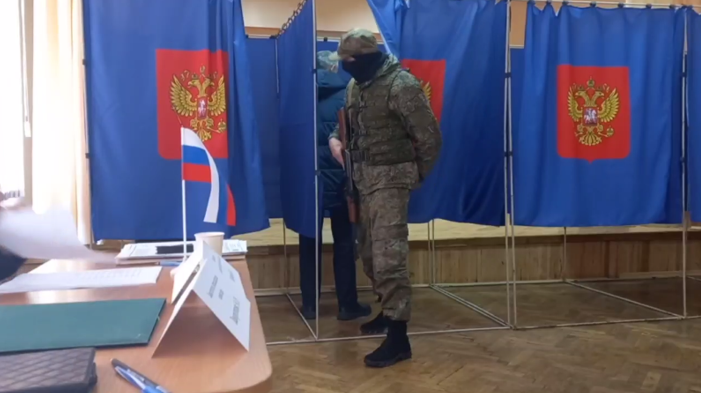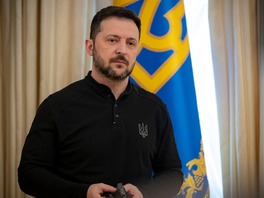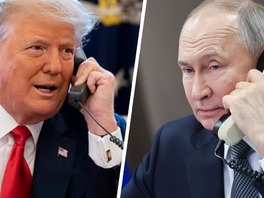The recent Russian presidential ‘election’ purportedly showcased overwhelming backing for Vladimir Putin. Official figures from the Russian Central Election Commission are natural to such extent that can be justified only with the facts of large-scale falsifications. Apostrophe provides evidence of these falsifications and elucidates the consequences of the continuation of Putin's rule for the temporarily occupied territories of Ukraine, where these violations have gained particular scope.
The Russian Central Election Commission reports that Putin secured a commanding 87.3% of the vote, followed distantly by Nikolay Kharitonov of the Communist Party with 4.3%. Vladyslav Davankov of "New People" and Leonid Slutsky of the Liberal Democratic Party trailed with 3.8% and 3.2%, respectively. Notably, all contenders, whether from pro-government parties or the so-called systemic opposition, largely align with Putin's policies.
In Ukraine's temporarily occupied territories, Putin purportedly garnered even higher percentages. Allegedly, in Crimea, nearly 93.6% of residents supported him, with 92.6% in Sevastopol. In Donetsk, he supposedly received 95% of the votes, and in Luhansk, 94%. Occupied districts in the Kherson region credited Putin with 88%, while Zaporizhzhia saw nearly 93% support for him.
Residents of the occupied territories, especially in Crimea, anticipated skewed outcomes, but even they were taken aback by these anomalous results. A Simferopolfemale resident informed Apostrophe that none of her acquaintances visited polling stations. Those unlawfully added to the voter register by occupation authorities reportedly cast their votes online, she explained.
To simulate a high turnout, occupation authorities coerced state and communal workers, who rely on government salaries, into participating. For instance, employees of the 7th Simferopol City Hospital were mandated to vote at polling stations or online, then report to management. Similarly, school staff in Bakhchisarai were instructed to vote through any means possible, and then report back.
Demonstrating 'support' in Ukraine's occupied territories was crucial for Putin to legitimize the occupation. The Kremlin was prepared to employ any means. With the apparent backing secured, the male population in these regions could now be mobilized into the Russian army under the pretext of "protecting" the new 'motherland,' namely Russia.
‘Ukraine's occupied regions are becoming akin to concentration camps, stripping residents of their rights, except for one: being mobilized into the occupation army to fight against their own nation and compatriots. Thus, Putin's election "results" and political designs in these territories are inconsequential. The true intentions of the Kremlin, articulated by raving Dmitrii Medvedev, is the complete annihilation of Ukraine as a state. People from the occupied territories are viewed merely as expendable assets in achieving this goal,’ Kostyantyn Batozkyi, a political expert and head of the Azov Region Development Agency, explained to Apostrophe.
More groovy ‘elections’ was only in Chechnya, which saw an improbable 99% voter turnout in favor of Putin. However, the unchallenged triumph of the Kremlin leader across Russian territories raised no doubts. This information only strengthens the argument that the so-called presidential ‘election’ in Russia was manipulated. A study by "Novaya gazeta Europa" based on 97% of the Central Election Commission's processed protocols reveals the extent of falsifications. At least 31.6 million out of 64.7 million votes cast for Putin are likely counterfeit. Overall, excluding electronic voting, the elections saw 74.5 million voters participating.
The study utilized the methodology of Russian mathematician and election analyst Sergey Shpilkin. According to his approach, a substantial portion of votes for the leading candidate (in this instance, Vladimir Putin) in precincts with exceptionally high turnout is deemed anomalous and suggests widespread fraud.
In light of these findings, the actual election results are likely significantly divergent from the official data released by the Russian Central Election Commission. According to independent exit polls conducted by the ExtremeScan project in Russia, Vladimir Putin's support likely capped at around 55%. ExtremeScan's sociologist, Elena Konyeva, reported on TV Rain that their survey, conducted over Saturday and Sunday with a substantial sample size of 4,000 respondents, revealed a voter turnout of 72%. Putin's rating stood at 55%, with Davankov at 3%, Kharitonov at 2%, and Slutsky at 1%. Additionally, 1% spoiled their ballots, while another 1% say something else, and a significant 37% refused to disclose their choice.
According to Elena Konyeva, factoring in all Russian voters, including those who abstained, Vladimir Putin garnered support from approximately 44%. This figure aligns with the Novaya Gazeta research findings, which, based on Shpilkin's methodology, suggest that about half of the ballots supposedly cast for Putin were surreptitiously added by polling station members as part of fraud.
The international community has unanimously rejected the "elections" of the Russian Federation's president in Ukraine's temporarily occupied territories. Stéphane Dujarric, a representative of the UN Secretary-General, condemned the "voting," emphasizing that the UN Secretary-General asserts the illegal annexation attempt of these territories as null and void under international law. Dujarric highlighted that over 50 countries, including the United States, France, Great Britain, Japan, Australia, and South Korea, jointly condemned the conduct of elections in the occupied territories.
Regarding the recognition of Putin as the winner in general, opinions are split. While the European Union refrained from explicitly labeling the Russian Federation leader's elections as illegitimate, Germany and Lithuania firmly stated their non-recognition of the results. France also joined in, refusing to acknowledge Putin's election outcome as valid.
‘Formally, likening Putin to a "second Lukashenko" isn't feasible. While the West disputes the results, the Russian Federation's possession of nuclear weapons prevents complete isolation for the Kremlin. Furthermore, what holds more weight is the International Criminal Court's issuance of a warrant against Putin for his actions in Ukraine,’Volodymyr Fesenko, the head of the Center for Applied Political Research Penta explained to Apostrophe.
paraphrase this like you are C2 english speaking american geopolitical international economical analyst In Bloomberg articles style. Speak as short, clear and concise as possible





